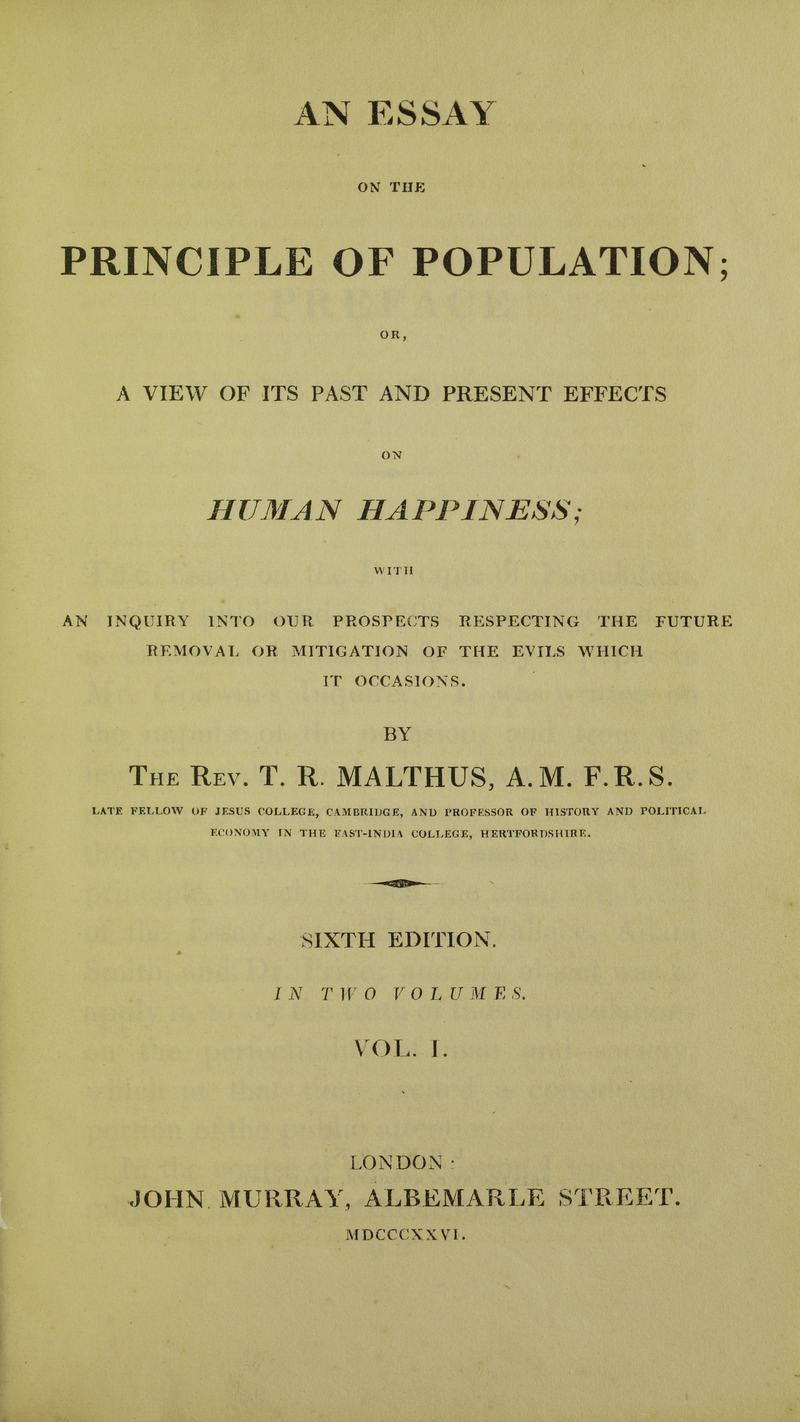Top Stories
Channelling the Malthusian Roots of Climate Extremism
Malthusian hysteria has become embedded in all sorts of extremist sects.

In a prank orchestrated by a fringe group called Lyndon LaRouche PAC, a woman stood up at a town hall event hosted by Rep. Alexandria Ocasio-Cortez (D-NY) on Thursday night, and declared that humankind needed to eat babies to prevent climate change.
Speaking with an accent reminiscent of Sacha Baron Cohen’s Borat character, the woman said, “We’re not going to be here much longer, because of a climate crisis. We only have a few months left. I love that you support the Green [New] Deal, but it’s not going to get rid of fossil fuel. It’s not going to solve the problem fast enough.” She added that Americans should “start eating babies” and “bomb Russia” as preliminary steps to save the planet.
Ocasio-Cortez reacted passively, and later tweeted that the woman may suffer from a mental condition. But it was a prank, which might have been obvious to anyone familiar with Jonathan Swift’s famous 1729 satirical essay, A Modest Proposal—in which he argued that the problem of poverty in Ireland might be alleviated if the poor sold their children to the rich for food. “A young healthy child well nursed, is, at a year old, a most delicious nourishing and wholesome food, whether stewed, roasted, baked, or boiled,” he wrote. “And I make no doubt that it will equally serve in a fricassee, or a ragout.”
Progressives and environmentalists are dismissing the prank, noting that it appears to have been carried out by a pro-Trump political action committee dedicated to the rehabilitation of eight-time presidential candidate Lyndon LaRouche, who has promoted the view that 9/11 was an “inside job,” that global warming isn’t real, that black people didn’t really create Jazz music, that the Beatles were created by the “British Psychological Warfare Division,” and dozens of other conspiracy theories.
But whatever the discredited nature of the source, the substance of prank itself was a brilliant send-up of the apocalyptic and Malthusian character of today’s environmental extremism, and the hypocritical nature of those who advocate for it.

Environmentalists insist that developing nations adopt renewable energy sources, enhance energy efficiency, and adopt a low-energy lifestyle—even though no poor nation can develop without high levels of energy consumption. So while the Norwegian government produces natural gas in Mozambique and Tanzania, it is simultaneously participating in a European push to prevent those same countries from building their own natural gas power plants.
Climate extremists also have successfully pressured the World Bank and other financial institutions to reduce financing for poor countries seeking to expand their energy production. In 2014, for instance, Senator Patrick Leahy of Vermont, the ranking Democrat on the Appropriations Committee, sought to cut off U.S. development funding to poor nations seeking to build hydroelectric dams, on the basis that such dams have a “negative impact” on river ecosystems. “If Senator Leahy is so adamantly against hydropower,” wrote a development specialist, “let him show his commitment by first turning out the lights of Vermont.”
Last year, the Intergovernmental Panel on Climate Change (IPCC) issued a report that rests heavily on the idea that poor nations can grow rich while using radically less energy. “Pathways compatible with 1.5°C that feature low energy demand,” IPCC officials said, “show the most pronounced synergies and the lowest number of trade-offs.” The IPCC also repeated a debunked claim that poor nations can “leap-frog” rich nations with solar panels, batteries and energy efficiency, and promoted “bio-energy”—the use of wood, dung and ethanol—fuels that are not only uneconomical, but also happen to come with their own hugely negative environmental impacts. In truth, energy consumption is as tightly coupled to per capita GDP today as it was when today’s rich nations were themselves poor.
Perhaps the greatest hypocrisy is for people like Rep. Ocasio-Cortez and Swedish student climate activist Greta Thunberg to seek to shut down nuclear power plants while claiming the end is coming from climate change. Rep. Ocasio-Cortez has endorsed the closure of Indian Point nuclear power plant in New York, which will be replaced with natural gas, while Thunberg attacked nuclear energy on Facebook as “dangerous.” And yet nuclear energy provides the majority of carbon-free electricity in the United States and over 40% of total electricity in Sweden.

The most doctrinaire and apocalyptic forms of modern “environmentalism” are simply a repackaging of the ideas of Thomas Malthus, the 19th-century British economist who thought that there were too many poor people out there—particularly poor Irish people—and that the ethical thing to do was let them die. “Instead of recommending cleanliness to the poor, we should encourage contrary habits,” he wrote, “and court the return of the plague.”
Unlike Swift, Malthus was no satirist. He was making a utilitarian argument: If we let the poor reproduce they would just end up creating more suffering in the future. (Indeed, the British government and media used Malthus’ ideas to justify the policies that led to mass starvation in Ireland from 1845 to 1849.) The LaRouchian protestor who spoke at Alexandria Ocasio-Cortez’s thursday event channeled Malthus’ horrifying logic faithfully. And in a more polite form, environmentalists channel it themselves when they urge that poor countries shoot themselves in the foot economically so that the world might be a greener place.
After World War II, prominent American progressives drew on Malthus’ ideas to oppose development aid and nuclear energy, and promote coerced sterilization. Cheap energy, prominent scientists feared, would lead to overpopulation, deplete scarce resources, and destroy the environment. Humankind “would not rest content until the earth is covered completely, and to a considerable depth, with a writhing mass of human beings, much as a dead cow is covered with a pulsating mass of maggots,” the chemist Harrison Brown wrote in his 1954 book, The Challenge of Man’s Future.
Anti-humanist ideas came full bloom in Stanford biologist Paul Ehrlich’s 1969 Sierra Club book, The Population Bomb, which depicted poor people in India as animals “screaming…begging…defecating and urinating.” Two decades later, the United Nations seemed to embrace elements of neo-Malthusianism in a report called Our Common Future. Rather than move to fossil fuels and nuclear, the UN experts opined, poor nations should instead use wood fuel more sustainably. And “wood-poor nations must organize their agricultural sectors to produce large amounts of wood and other plant fuels.” (Ironically, the lead author of Our Common Future was Gro Brundtland, former Prime Minister of Norway, a nation which just a decade earlier had become fabulously wealthy thanks to its abundant oil and gas reserves.)

Malthusian hysteria has become embedded in all sorts of extremist sects. Indeed, two recent mass shooters—one in El Paso, Texas, and the other in Christchurch, NZ—echoed some version of the apocalyptic rhetoric of Malthusian environmentalists. Yet Malthusian environmentalists are preaching a debunked creed, for their prophet wrongly predicted that famines and resource scarcity would become common features of a densely populated world. Instead, technology has outpaced increases in population and consumption—so that today we face the prospect of reducing the total amount of natural resources (including land) required to sustain us.
The power of Swift’s original parody was that it motivated readers to consider the values of the person proposing such schemes. This week’s hoax may have a similar effect when it comes to the most extreme forms of environmentalist rhetoric. Indeed, the hoaxer wasn’t wrong when she said that a Swedish scientist really had floated the idea of eating the human dead as a means to help save the planet.
If we are to believe Rep. Ocasio-Cortez’s claim that humankind has only 12 years left to save civilization from climate change, then surely the truly more modest proposal of operating today’s nuclear plants while pursuing the French and Swedish model of building standardized nuclear power plants, would be warranted.
In seeking to calm the woman, Ocasio-Cortez said, “One of the things that is very important to us is that we need to treat the climate crisis with the urgency that it does present…Luckily, we have more than a few months.” For once, she sounded like a voice of reason. It would be nice if she—and her fellow environmentalists—made it a habit.






